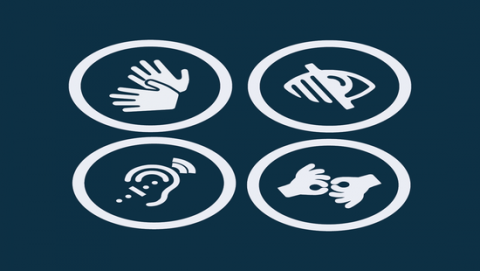
Service handicap santé étudiant | about us
The Student Health Disability Service (SHSE) is designed for all students who have a health problem that affects their studies, and who would like to be supported by the service.
What is disability?
LAW OF FEBRUARY 11, 2005 FOR EQUAL RIGHTS AND OPPORTUNITIES, PARTICIPATION AND CITIZENSHIP OF DISABLED PEOPLE - ARTICLE 2Constitutes a handicap [...] any limitation of activity or restriction of participation in social life that is suffered by a person because of a substantial, lasting or permanent impairment of one or more physical, sensory, mental, cognitive or psychic functions, a multiple handicap or a disabling health disorder.
The SHSE's missions fall within the scope of the university's obligations to meet, on the one hand, the objectives of the law "for equal rights and opportunities, participation and citizenship of disabled people" of February 11, 2005 and, on the other hand, the commitments specified in the university / disability charter co-signed by the Ministry of Higher Education, Research and Innovation (MESRI), the Ministry of Labor, Social Relations and Solidarity (MTRSS) and the Conference of University Presidents (CPU).
The service is responsible for:
- organizing the reception of students in collaboration with the various university services (schooling, medical service, EFU, etc.) or external services (Crous, MDPH, etc.) and helping students to build a training project in line with their career plans;
- carrying out a personalized analysis of students' needs within the framework of their chosen course, in collaboration with the teaching teams;
- setting up technical and/or human compensation methods (note-taking, tutoring, etc.) and modifying them if necessary during the year according to the student's needs;
- organizing and managing all tests and associated accommodations;
- facilitating the professional integration of these students.
To date, the SHSE welcomes all students who request it, whatever their disability (physical, sensory, psychological, disabling illness or temporary handicap).
Personalized and welcoming support tailored to your needs
The SHSE's mission is in line with the policy defined by the French Ministry of Education and Sorbonne University in 1973.
The support we offer focuses on:
- comprehensive, individualized student care;
- close collaboration between the SHSE team and local expertise (preventive medicine service, training departments, social service, orientation and integration service, Crous, etc.).
The department acts as an interface with these different structures. However, this support can only be provided with the approval and willingness of the student, who remains the driving force behind his or her project.
We offer:
- an individual, confidential interview to analyze needs and difficulties;
- Follow-up of needs throughout the university curriculum;
- solutions adapted to your situation: study, internship and exam accommodations;
- advice on career orientation and integration in collaboration with the Orientation and Integration Service (SOI).
Each and every one of us has his or her own image of disability, and sometimes clichés arise. These are far from reflecting reality and the diversity of situations. As each situation is varied, disability can be broken down into different types of disorder:
- Visual disorders: whether they are present from birth or appear later in life, visual disorders are diverse and are not limited to blindness.
- Hearing impairment: not visible, but significantly compromises communication and access to information.
- Motor disorders: can lead to partial or total motor impairment, particularly of the upper and/or lower limbs (difficulty in moving around, maintaining or changing position, picking up and handling, performing certain gestures).
- Cognitive disorders: specific cognitive disorders and the learning difficulties they cause are grouped together under "Dys disorders".
- Psychological disorders: most often invisible, they are the consequence of various illnesses that can affect all populations, regardless of sex or age, and can be temporary or permanent, such as depression, bipolar disorder, etc.
- Visceral disorders: refer to disabling illnesses that can affect all vital functions: heart, kidneys, lungs, etc., and all systems of the human body: respiratory, blood, lymphatic, nervous, immune, etc.
Contact
Student health and disability service (SHSE)
Sorbonne Université
Campus Pierre et Marie Curie
Patio 22-33, niveau Jussieu
4 Place Jussieu 75252 Paris Cedex 05
Opening hours: Tuesday to Friday, 9am to 12pm and 2pm to 5pm



